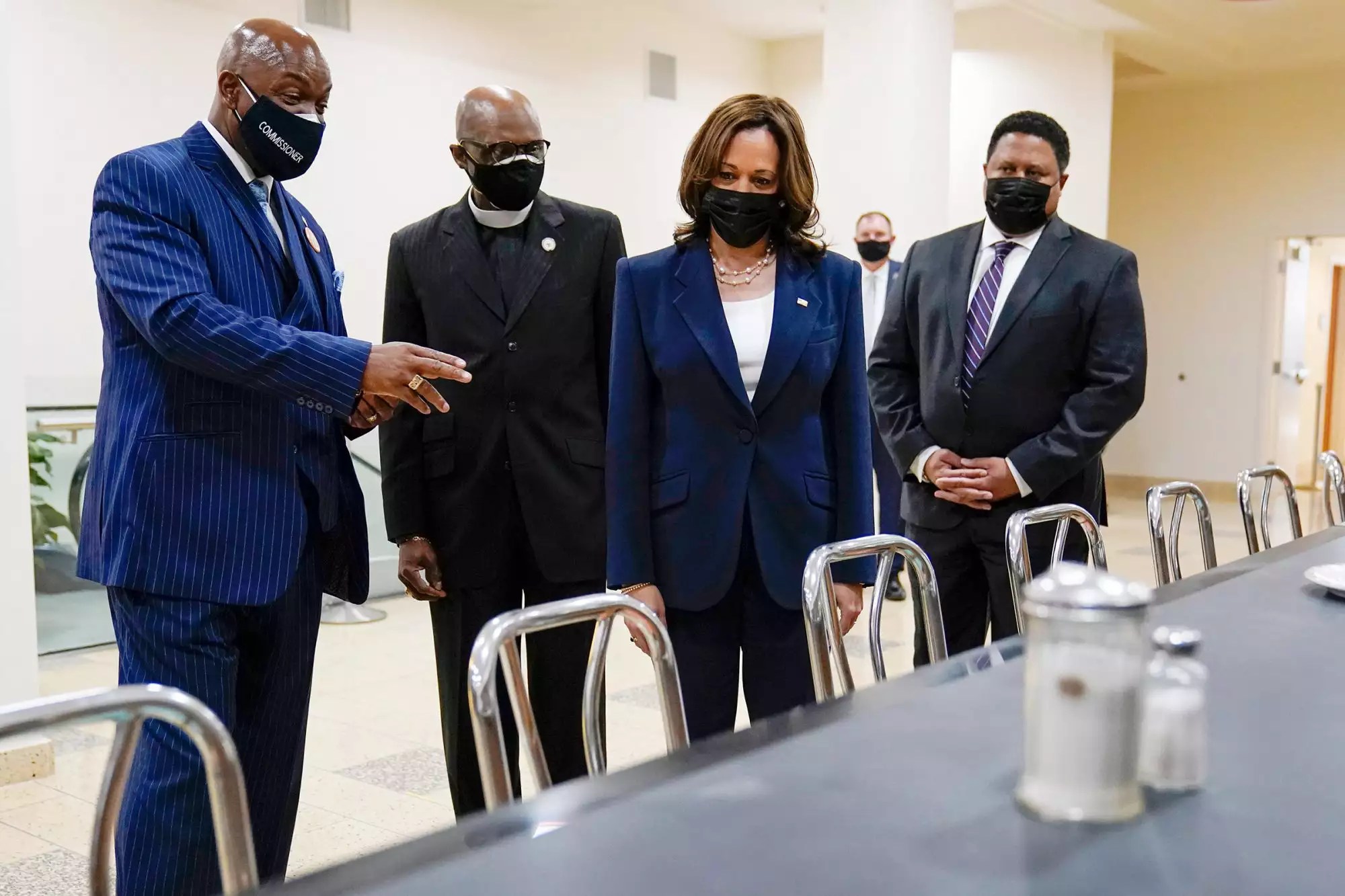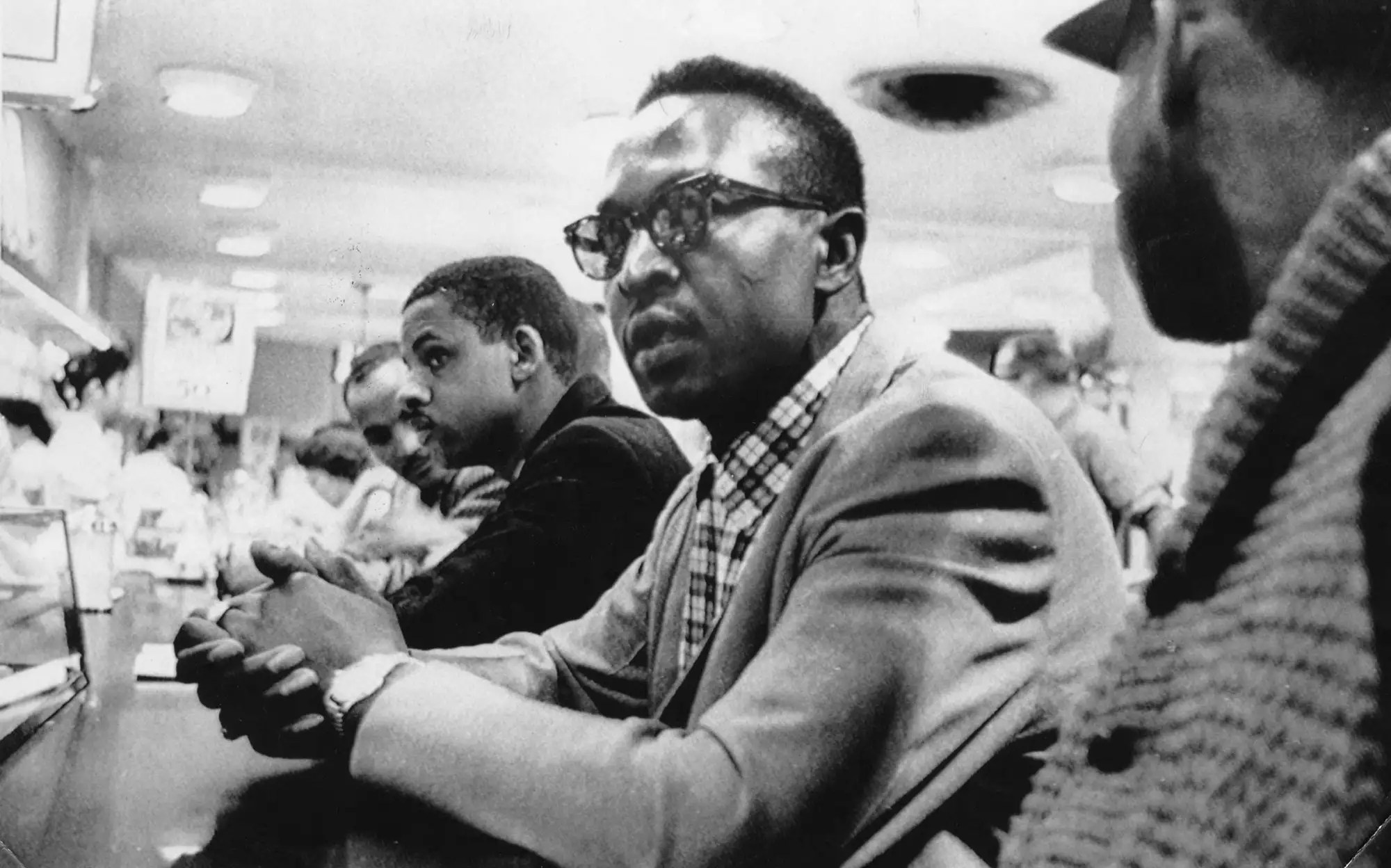Vice President Kamala Harris (center) sits at a formerly segregated lunch counter, where Rosa Parks sat during a visit to the site in the 1990s, as Harris visits the International Civil Rights Center & Museum in Greensboro, North Carolina.Photo: SAUL LOEB/AFP via GettyVice PresidentKamala Harrismade a surprise stop during her trip to North Carolina on Monday to recognize a defining moment in the history of the civil rights movement.Harris, 56, visited the International Civil Rights Center & Museum in Greensboro to see the bus seat Rosa Parks refused to give up in 1955 in Montgomery, Alabama.While there, Harris also sat at the same Woolworth diner counter where four Black men, known as the “Greensboro Four,” held a peaceful sit-in protest against segregation in 1960.Harris — who is the first woman and first person of color to be vice president — was photographed sitting in the same diner seat Parks sat in during the civil rights icon’s own visit to the museum in the 1990s. Parks' 1955 bus seat is also preserved in an exhibit, according tothe Associated Press.The vice president made the unannounced stop following a visit to North Carolina to promote PresidentJoe Biden’s proposed $2.3 trillion infrastructure plan, which Democrats hope to pass over Republican opposition.Vice President Kamala Harris.Carolyn Kaster/AP/ShutterstockVice President Kamala Harris.Carolyn Kaster/AP/ShutterstockSit-in at the Woolworth store’s lunch counter in Greensboro, N.C. in February 1960.Atlanta Journal-Constitution/APAt the museum, reporters traveling with Harris noted the vice president had sat down at the former “White’s Only” counter inside the now-defunct Woolworth diner.The museum was built in 1993 around the old Woolworth building, leaving the lunch counter intact where four Black college students — Franklin McCain, Joseph McNeil, Jibreel Khazan and David Richmond — first sat down on Feb. 1, 1960, and asked for service.The students were denied lunch at the “White’s Only” counter, but they continued to return to the diner every day and soon sparked a nationwide sit-in movement, protesting racial injustice — a defining chapter in the push for civil rights and in American history.Vice President Kamala Harris.SAUL LOEB/AFP via GettyVice President Kamala Harris.SAUL LOEB/AFP via GettyThe four men have said Parks' renowned refusal to give up her bus seat in 1955 was an inspiration for their own sit-in. Woolworth desegregated in July 1960, according toTIME, and many restaurants and businesses around the country soon followed.On Monday, Harris also reportedly took time to talk with museum curators about the history of both demonstrations.The museum staff told her stories about the civil rights movement, information about the items in the museum and the historic figures who participated in the protests.Harris told reporters she had met Parks before the latter died 15 years ago.Reporters traveling with Harris said she also pointed out a photograph displayed of the late Rep. John Lewis, a prominent leader of the civil rights movement who served in Congress for 33 years. Lewisdied at age 80last July of pancreatic cancer.Harris quoted him inher acceptance speechin November, after she and Biden won the 2020 election: “Congressman John Lewis, before his passing, wrote: ‘Democracy is not a state. It is an act,’ " she said.She also previously recognized the “Greensboro Four"on Twitter, in 2019.“Their courage, strength, and refusal to accept injustice brought our nation a step closer to who we can and should be,” Harris wrote then.
Vice President Kamala Harris (center) sits at a formerly segregated lunch counter, where Rosa Parks sat during a visit to the site in the 1990s, as Harris visits the International Civil Rights Center & Museum in Greensboro, North Carolina.Photo: SAUL LOEB/AFP via Getty

Vice PresidentKamala Harrismade a surprise stop during her trip to North Carolina on Monday to recognize a defining moment in the history of the civil rights movement.Harris, 56, visited the International Civil Rights Center & Museum in Greensboro to see the bus seat Rosa Parks refused to give up in 1955 in Montgomery, Alabama.While there, Harris also sat at the same Woolworth diner counter where four Black men, known as the “Greensboro Four,” held a peaceful sit-in protest against segregation in 1960.Harris — who is the first woman and first person of color to be vice president — was photographed sitting in the same diner seat Parks sat in during the civil rights icon’s own visit to the museum in the 1990s. Parks' 1955 bus seat is also preserved in an exhibit, according tothe Associated Press.The vice president made the unannounced stop following a visit to North Carolina to promote PresidentJoe Biden’s proposed $2.3 trillion infrastructure plan, which Democrats hope to pass over Republican opposition.Vice President Kamala Harris.Carolyn Kaster/AP/ShutterstockVice President Kamala Harris.Carolyn Kaster/AP/ShutterstockSit-in at the Woolworth store’s lunch counter in Greensboro, N.C. in February 1960.Atlanta Journal-Constitution/APAt the museum, reporters traveling with Harris noted the vice president had sat down at the former “White’s Only” counter inside the now-defunct Woolworth diner.The museum was built in 1993 around the old Woolworth building, leaving the lunch counter intact where four Black college students — Franklin McCain, Joseph McNeil, Jibreel Khazan and David Richmond — first sat down on Feb. 1, 1960, and asked for service.The students were denied lunch at the “White’s Only” counter, but they continued to return to the diner every day and soon sparked a nationwide sit-in movement, protesting racial injustice — a defining chapter in the push for civil rights and in American history.Vice President Kamala Harris.SAUL LOEB/AFP via GettyVice President Kamala Harris.SAUL LOEB/AFP via GettyThe four men have said Parks' renowned refusal to give up her bus seat in 1955 was an inspiration for their own sit-in. Woolworth desegregated in July 1960, according toTIME, and many restaurants and businesses around the country soon followed.On Monday, Harris also reportedly took time to talk with museum curators about the history of both demonstrations.The museum staff told her stories about the civil rights movement, information about the items in the museum and the historic figures who participated in the protests.Harris told reporters she had met Parks before the latter died 15 years ago.Reporters traveling with Harris said she also pointed out a photograph displayed of the late Rep. John Lewis, a prominent leader of the civil rights movement who served in Congress for 33 years. Lewisdied at age 80last July of pancreatic cancer.Harris quoted him inher acceptance speechin November, after she and Biden won the 2020 election: “Congressman John Lewis, before his passing, wrote: ‘Democracy is not a state. It is an act,’ " she said.She also previously recognized the “Greensboro Four"on Twitter, in 2019.“Their courage, strength, and refusal to accept injustice brought our nation a step closer to who we can and should be,” Harris wrote then.
Vice PresidentKamala Harrismade a surprise stop during her trip to North Carolina on Monday to recognize a defining moment in the history of the civil rights movement.
Harris, 56, visited the International Civil Rights Center & Museum in Greensboro to see the bus seat Rosa Parks refused to give up in 1955 in Montgomery, Alabama.
While there, Harris also sat at the same Woolworth diner counter where four Black men, known as the “Greensboro Four,” held a peaceful sit-in protest against segregation in 1960.
Harris — who is the first woman and first person of color to be vice president — was photographed sitting in the same diner seat Parks sat in during the civil rights icon’s own visit to the museum in the 1990s. Parks' 1955 bus seat is also preserved in an exhibit, according tothe Associated Press.
The vice president made the unannounced stop following a visit to North Carolina to promote PresidentJoe Biden’s proposed $2.3 trillion infrastructure plan, which Democrats hope to pass over Republican opposition.
Vice President Kamala Harris.Carolyn Kaster/AP/Shutterstock


Sit-in at the Woolworth store’s lunch counter in Greensboro, N.C. in February 1960.Atlanta Journal-Constitution/AP

At the museum, reporters traveling with Harris noted the vice president had sat down at the former “White’s Only” counter inside the now-defunct Woolworth diner.
The museum was built in 1993 around the old Woolworth building, leaving the lunch counter intact where four Black college students — Franklin McCain, Joseph McNeil, Jibreel Khazan and David Richmond — first sat down on Feb. 1, 1960, and asked for service.
The students were denied lunch at the “White’s Only” counter, but they continued to return to the diner every day and soon sparked a nationwide sit-in movement, protesting racial injustice — a defining chapter in the push for civil rights and in American history.
Vice President Kamala Harris.SAUL LOEB/AFP via Getty


The four men have said Parks' renowned refusal to give up her bus seat in 1955 was an inspiration for their own sit-in. Woolworth desegregated in July 1960, according toTIME, and many restaurants and businesses around the country soon followed.
On Monday, Harris also reportedly took time to talk with museum curators about the history of both demonstrations.
The museum staff told her stories about the civil rights movement, information about the items in the museum and the historic figures who participated in the protests.
Harris told reporters she had met Parks before the latter died 15 years ago.
Reporters traveling with Harris said she also pointed out a photograph displayed of the late Rep. John Lewis, a prominent leader of the civil rights movement who served in Congress for 33 years. Lewisdied at age 80last July of pancreatic cancer.
Harris quoted him inher acceptance speechin November, after she and Biden won the 2020 election: “Congressman John Lewis, before his passing, wrote: ‘Democracy is not a state. It is an act,’ " she said.
She also previously recognized the “Greensboro Four"on Twitter, in 2019.
“Their courage, strength, and refusal to accept injustice brought our nation a step closer to who we can and should be,” Harris wrote then.
source: people.com